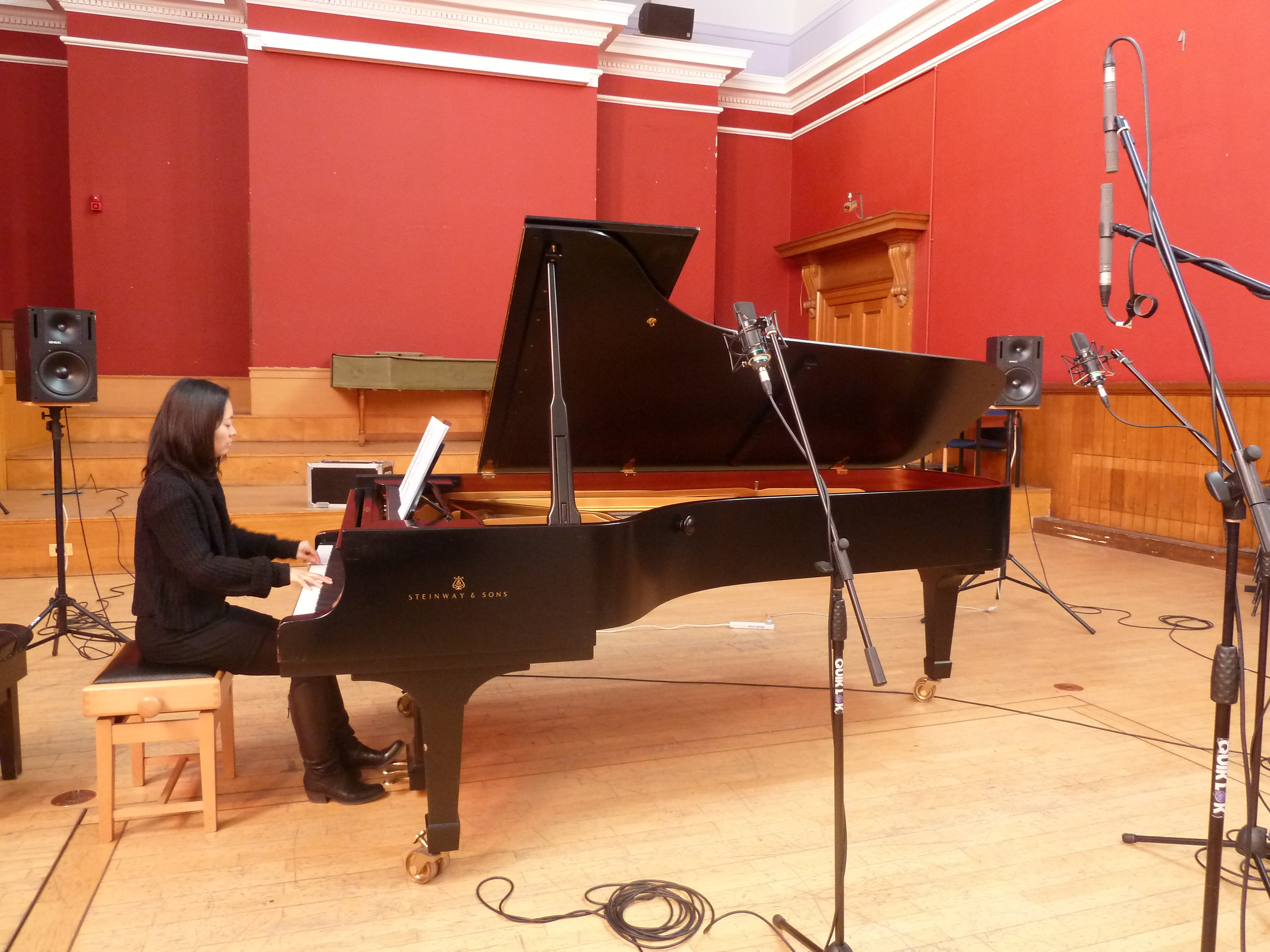MICHAEL EDWARDS Algorithmic Compositions (Sumtone, stcd4): Michael Edwards beruft sich auf Cage, die Kabbalah, Guido D’Arezzo und Bach als Unterbau seiner Kompositionstechnik und der dabei eingesetzten eigenen Software ‘slippery chicken’ . Damit hat der mit Lapslap auf Leo Records bekannte Elektroakustiker in Edinburgh die fünf hier präsentierten Stücke realisiert: ‘Altogether disproportionate’ für Piano und Computer (mit Per Rundberg – Piano und Edwards – Screams) zeigt ein unvermutet politisches Unterfutter, denn es bezieht sich auf ein Zitat von Winston Churchill, das klar benennt, dass sich Großbritannien ein ganz unverhältnismäßig großes Stück vom Kuchen gewaltsam angeeignet hat. Am Gegenpol dazu steht Becketts Egolosigkeit, auf der ‘who says this, saying it’s me’ basiert, geschrieben für Tenorsaxophon (Gianpaolo Antongirolami) und four-channel sound file. ‘Tramontana’ für Viola und Computer ist, mit einem Gedicht von Eugenio Montale im Ohr, eine Reminiszenz an Edwards Zeit in Italien, nachdem er zuvor fünf Jahre in Salzburg gelebt hatte. Ein Gedicht von Adrienne Rich war namensgebend für ‘don’t flinch’ für Gitarre und Computer, in dem Ry Cooders Bottleneck nachhallt. Edwards lässt seine Musik abseits aller (Rumpel)-Kammergewohnheiten und Antiquitätenladenvorlieben sich in Laboratmosphäre entfalten. Erweiterte und, speziell was Rundberg angeht, futuristisch rabiate Spieltechniken der Instrumentalisten verbinden sich mit vergleichsweise feinen Hightechsounds. Zuerst sind schroffe Schläge, abrupte Sprünge und Schreie Programm, gipfelnd in MG-Feuer, wohl eingedenk von Hilaire Bellocs: Whatever happens, we have got / The Maxim gun, and they have not. Damit kontrastieren dann abgerissene Luftstöße, Geschnaube und tonloses Klappengeflatter, untermischt mit elektronischen Clicks und Glitches und unruhigen Klanggespinsten. Für Beckettsche Verhältnisse geht es ziemlich turbulent zu und kakophon sowieso. Die im Ensemble InterContemporain und dem Arditti Quartet härtegetestete Bratsche von Garth Knox kommt danach ganz getarnt daher. Mit Schlägen und wie geblasenen Klängen, schrill ‘flötenden’ Schraffuren und noch verdichtetem Geprassel lässt sie als eine kalte und immer aggressivere Böe einen frösteln und sich ducken. Dass Edwards vor programmatischen und plastischen Anmutungen nicht zurückscheut, ist für mich kein Manko. Zagende können wieder Mut fassen zur psychedelisch umorgelten und mit Pianosplittern gespickten Akustikgitarre von Yvonne Zehner. Artauds ‘Schluss mit dem Gottesgericht’ ist dabei eine zusätzlich, wenn auch nur hintergründige Rückenstärkung.
MICHAEL EDWARDS Algorithmic Compositions (Sumtone, stcd4): Michael Edwards refers to Cage, the Kabbalah, Guido D’Arezzo, and Bach as a foundation for his composition technique using his own software ‘slippery chicken’ . With this software Michael Edwards (the electro-acoustic musician from Edinburgh who is known on Leo Records with Lapslap) realised the five pieces presented here: ‘altogether disproportionate’, for piano und computer (Per Rundberg – piano, Edwards – screams), displays an unexpected political background as it refers to a quotation by Winston Churchill that clearly demonstrates that Great Britain violently acquired a disproportionate share of the colonial pie. The other end of the spectrum has Beckett’s egolessness as the basis of ‘who says this, saying it’s me?’, written for tenor saxophone (Gianpaolo Antongirolami) and a four-channel sound file. ‘Tramontana’ for viola und computer is–with a poem by Eugenio Montale in mind–a reminiscence of Edwards’s time in Italy, after he had lived in Salzburg for five years. A poem by Adrienne Rich inspired the title ‘don’t flinch’ for guitar und computer, with echos of Ry Cooder’s bottleneck. Edwards avoids all of the (rumbling) common or garden “antiques shop” cliches, allowing his music instead to develop in the atmosphere of the laboratory. Extended and–especially in altogether disproportionate–ruthlessly futuristic instrumental techniques are combined with complementary hi-tech sounds. First there are abrasive sounds, abrupt jumps, and screams as part of the programme, mounting to machine gun fire, reminiscent of Hilaire Belloc’s: “Whatever happens, we have got / The Maxim gun, and they have not.” Contrasting with this are cut-off air jabs, snorts, and toneless key fluttering, mixed in with electric clicks and glitches and restless soundwebs. In the context of Beckett it is all quite turbulent and cacophonic actually. Following on from this, Garth Knox’s viola–already tested to the limit by the Ensemble Intercontemporain and the Arditti Quartet–seems quite camouflaged. With beats and sounds made as if blown, shrill whistling concoctions and even more compressed pattering, the viola acts as a cold and aggressive blast that makes you shiver and duck for cover. That Edwards doesn’t shrink away from programmatic, even graphic impressions is for me no defect. More apprehensive listeners can take refuge in the acoustic guitar piece ‘don’t flinch’. Artaud’s ‘To Have Done With the Judgment of god’ plays here an additional, merely background supportive role.”

Leave a Reply